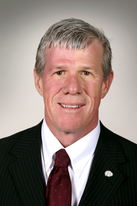I wanted to draw your attention to a little known house race that I believe has massive implications for the future of our state.
According to this Iowa Independent article, 23 year old Hillary staffer and newly minted Wartburg graduate Cayla Baresel is running for Iowa House District 17, currently held by Sen. Grassley's grandson, Pat Grassley (more on him later).
I don't wish to plagarize from the Iowa Independent article, but it represents virtually the only press her campaign has gotten to date, and so I will quote just a few paragraphs. I strongly encourage everyone to read the full article.
Having grown up in a single-parent household in Iowa, Baresel says the issues she feels most deeply about are education and health care. Those are followed closely by concerns for the economy and a need for more biofuels technology and environmental issues.
“It was a challenge for my mother, but she did an excellent job [raising my sister and me] and working two jobs most of the time,” Baresel said. “Higher education can sometimes feel as if it is out of reach. It's expensive now and it gets more and more expensive every year. I also know there are people in this district who can't afford health care premiums so they do without insurance. We've got to create more opportunities. We've got to give young Iowans a reason to remain in our state. Those are big concerns not only for the individuals in those situations, but for the district as a whole.”
When the election is said and done, Baresel says she wants the voices and needs of the people to be the driving force in Des Moines.
“I've had the opportunity to hear the stories of the people in Butler and Bremer counties. I've heard what's important to them,” she said. “I know I would represent them and this area well. I know I would be a good representative because I would always represent the people.”
Can the same be said about her opponent, political legacy Pat Grassley?
Pat Grassley was elected to House District 17 in 2006 at the age of 23 (his grandfather was elected to the same district at the age of 24), having inherited longtime Republican Bill Dix's seat in an uncontested primary–the first of many benefits of the Grassley name.
According to the Iowa Ethics and Campaign Disclosure Board, in the 2006 election cycle (2005/2006), Pat Grassley raised and spent over $100,000–an unheard of sum for a non-leadership, rural, first-time candidate in a Republican leaning district. His opponent, 22 year old Alek Wipperman, raised and spent less than $15,000…meaning he was out spent more than five to one.
More disconcerting still, are the source of some of those contributions. According to the IEC and this article by the Waterloo-Cedar Falls Courier, Grassley recieved thousands of dollars of big name, politically connected PAC contributions including:
- $5000 from Sen. Mitch McConnell's Bluegrass Committee PAC
- $2000 from Fmr. Sen. Bill Frist's VOLPAC
- $2000 from Sen. Chuck Hagel's Sandhills PAC
- $1500 from Sen. Lindsay Graham's Fund for Americas' Future PAC
- $1000 from Sen. Max Baucus' Glacier PAC
- $1000 from Fmr. NY Gov. George Pataki's 21st Century Freedom PAC
- $1000 from the Republican Issues Campaign (RICPAC)
By the end of 2005, Grassley had racked up more than $13,000…meaning that Grassley raised and spent more money from PAC's alone than our challenger raised and spent total.
If that doesn't chill the blood, listen to this quote from Grassley himself in the fore mentioned article from the W-CF Courier.
“My grandpa and I talked, and I said I'd take any money that was legal and with no strings attached,” Pat says. “If people didn't feel confident in me, they wouldn't just sign a check over to me and be linked to me.”
In short, Grassley is the pinnacle of the new generation of big-money Washington conservatives in Iowa, and we need to put up a strong campaign against him now, or face the consequences in the future. We need to send a message that, in Iowa, people rise on their merits–not their political connections.
Don't be fooled: somewhere in the halls of power, a political path is being charted for the younger Grassley. There's no telling where that path lies, but be certain that it runs through the House, Senate or Terrace Hill. As the old doctor's adage goes, “an ounce of prevention is worth a pound of cure”, and every ounce of effort put into defeating Pat Grassley now will pay off in spades later.
I urge everyone to look into Ms. Baresel once she gets her campaign up and running, and seriously consider contributing. This is one race we can't afford to write off.
Continue Reading...

